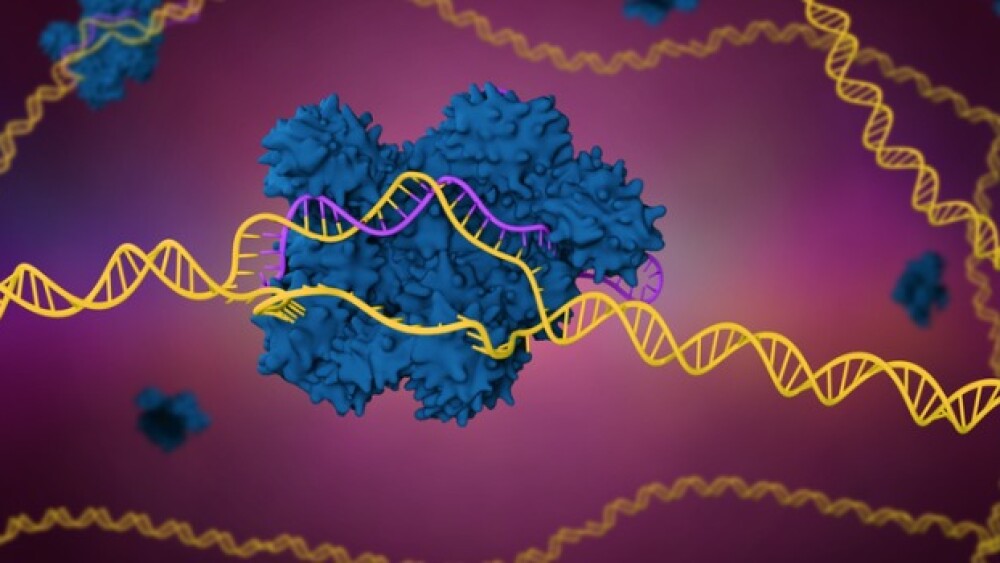The U.K.’s Medicines and Healthcare products Regulatory Agency on Thursday provided conditional marketing authorization for Vertex Pharmaceuticals and CRISPR Therapeutics’ gene-edited therapy exa-cel.
Pictured: An illustration of a CRISPR/Cas9 system attached to a DNA strand/iStock, Meletios Verras
The U.K.’s Medicines and Healthcare products Regulatory Agency on Thursday granted Vertex Pharmaceuticals and CRISPR Therapeutics conditional marketing authorization for their CRISPR/Cas9 gene-edited therapy exagamglogene autotemcel, now to carry the brand name Casgevy, for the treatment of sickle cell disease and transfusion-dependent beta thalassemia.
Casgevy is the world’s first CRISPR-based gene-edited therapy that has won regulatory approval, according to the companies.
Vertex CEO Reshma Kewalramani in a statement called the approval “historic” while CRISPR CEO Samarth Kulkarni said that he hopes Casgevy’s approval “represents the first of many applications of this Nobel Prize winning technology.”
The Medicines and Healthcare products Regulatory Agency (MHRA) grants conditional marketing authorizations (CMAs) to medicines that meet a significant unmet need or otherwise offer a strong therapeutic advantage over existing treatments—even in the absence of complete and comprehensive clinical data. CMAs are valid for a year and are renewable annually through an ongoing review of clinical data.
Casgevy’s conditional authorization is based on the findings of two global clinical trials, according to MHRA’s Thursday announcement of the approval. The sickle cell disease (SCD) study enrolled 45 patients but only 29 provided data mature enough for the primary efficacy interim analysis. In all but one of these eligible patients, Casgevy eliminated severe pain crises for at least 12 months following treatment.
In transfusion-dependent beta thalassemia (TDT), data came from 42 patients, of whom 39 achieved red blood cell transfusion independence for at least 12 months after receiving Casgevy. The other three patients saw a 70% drop in the need for transfusions.
Both studies also demonstrated a favorable safety profile for Casgevy, with its side effects generally consistent with autologous stem cell transplants. Common adverse events included fatigue, fever, nausea and a heightened risk of infections.
In the U.S., the FDA is scheduled to release its verdict on exagamglogene autotemcel (exa-cel) for SCD on Dec. 8, 2023 and for TDT on March 30, 2024.
Late last month, the FDA convened its Cellular, Tissue, and Gene Therapies Advisory Committee to discuss whether Vertex and CRISPR had conducted a sufficiently thorough analysis of exa-cel’s potential off-target effects. The panel of external experts sided with the pharma partners, finding that the companies had already done enough to establish the safety of exa-cel and that more specific testing can be done post-approval.
Casgevy is an autologous gene therapy that uses a patient’s own stem cells—which are harvested and genetically edited using CRISPR/Cas9—to increase their body’s production of fetal hemoglobin. It is indicated for SCD patients aged 12 years and older who suffer from recurrent vaso-occlusive crises. TDT patients with no available HLA-matched hematopoietic stem cell donors can receive Casgevy.
Tristan Manalac is an independent science writer based in Metro Manila, Philippines. He can be reached at tristan@tristanmanalac.com or tristan.manalac@biospace.com.






